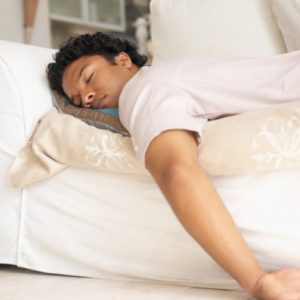
The researchers reviewed 25 studies, which included 253 sudden deaths. Body position during sleep was recorded. The researchers found that 73 percent of sudden deaths occurred in individuals sleeping on their stomach, and the remaining 27 percent accounted for other sleep positions.
Looking at a subgroup of 88 study subjects, the researchers found that individuals under 40 were four times more likely to sleep on their stomachs at the time of sudden death.
Tao added, “We’re not sure why this was more common in younger people. It may be that they are more likely to be single and not have anyone with them during a seizure while sleeping.”
“Similar to infant SIDS cases, adults often have an impaired ability to wake up after a seizure, especially a general seizure. Our findings highlight an important strategy for preventing sudden unexpected death in epilepsy — that ‘back is best’. Using wrist watches and bed alarms designed to detect seizures during sleep may also help prevent these deaths,” Tao concluded.
Change in heart activity may reveal epilepsy
Epilepsy has long been known as a brain disorder, but researchers at Case Western Reserve University also found that changes in heart activity can reveal seizures, too. Senior author Roberto Fernández Galán said, “All the findings of our study on heart rate variability in epilepsy point to increased activity in the parasympathetic nervous system during sleep. But we don’t know if this abnormality compensates for epilepsy, coincides with the disease, or is part of the etiology.”
The researchers found that children who were deemed neurologically normal but had strong breathing modulations (similar to those seen in epileptic children) and low heart rates were later diagnosed with epilepsy.
The researchers looked at 91 children and adolescents with generalized epilepsy and 25 neurologically normal children during 30 minutes of light sleep. The researchers uncovered that respiratory sinus arrhythmia – the increase in heart rate when breathing in and decrease when breathing out – was more pronounced in epileptics, and that their heart rate also was significantly lower.
There was also no difference in blood pressure between the two groups of children, which indicates that the part of the nervous system responsible for fight-or-flight response was not involved.
The researchers discuss the possibility of using medications to control the autonomic nervous system as a means of treating epilepsy.
Undergraduate researcher Siddharth Sivakumar added, “This may be a key contributing factor. The heart rate and breathing decline dramatically after a seizure. If they are already low, and are then lowered further, that may cause a child to go a minute or more without a breath or pulse.”
Adult treatment for epilepsy involves the implantation of an electrode to stimulate the vagus nerve, which stimulates the brain. Galán cautions that this method should not yet be used on children despite his findings.